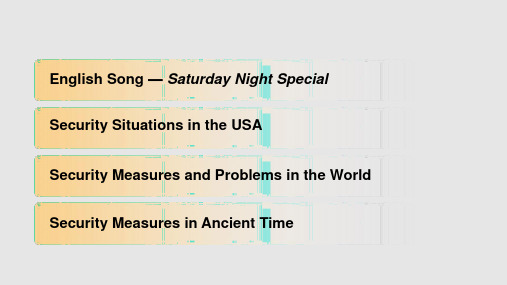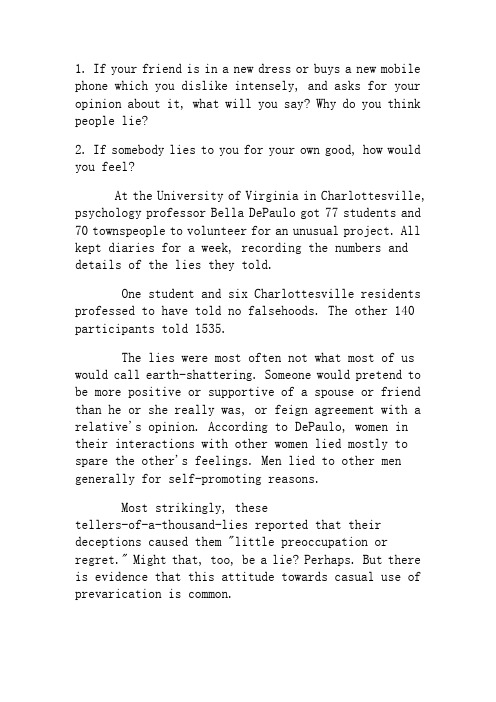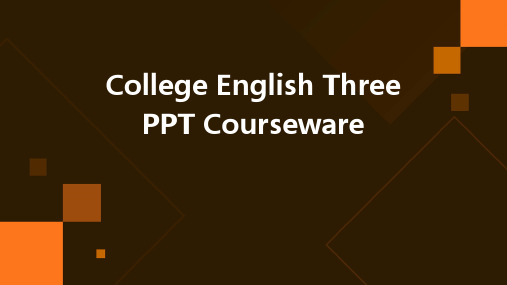11大学英语专业第三册ppt
大学英语三ppt课件

Foster critical thinking by engaging students in comparative analysis of cultural and linguistic differences between the source language and their native language, enhancing their intercultural awareness
01
Course Introduction and Learning
Chapter
Introduction to the Three Courses
01
Comprehensive English Course
A course that covers all aspects of English language skills,
A wide range of topics and levels of diversity in listening materials can help students develop their listening skills in different contexts and gradually increase their listening efficiency
English Course"
03
Reference Materials: Oxford English Dictionary,
grammar and writing handbooks
Textbooks and Reference Materials
Business English Course Textbook: "Business English: A Complete Course" Reference Materials: Business dictionaries, trade publications, and financial reports
全新版大学英语第三册第二版电子Unit3PPT课件

Terrorist Attacks on Sept. 11, 2001 Listen and decide whether the following statements are true (T) or false (F).
Terrorist Attacks on Sept. 11, 2001
Wherever you were in lower Manhattan before September 11th, 2001, two buildings dominated the landscape. Critics said the World Trade Center towers didn’t relate to their surroundings and weren’t especially pleasing in design. But the fact is that they were big, undeniably and frighteningly so, and a walk across the plaza in summer months could make your head reel. On February 26, 1993, the World Trade Center complex was rocked by an explosive device left in one of the underground parking lots; six people were killed and over a thousand injured.
So why don’t we dump ’em people To the bottom of the sea Before some ole fool come around here Wanna shoot either you or me
大学英语专业综合教程第三册Unit11课文及单词

1. If your friend is in a new dress or buys a new mobile phone which you dislike intensely, and asks for your opinion about it, what will you say? Why do you think people lie?2. If somebody lies to you for your own good, how would you feel?At the University of Virginia in Charlottesville, psychology professor Bella DePaulo got 77 students and 70 townspeople to volunteer for an unusual project. All kept diaries for a week, recording the numbers and details of the lies they told.One student and six Charlottesville residents professed to have told no falsehoods. The other 140 participants told 1535.The lies were most often not what most of us would call earth-shattering. Someone would pretend to be more positive or supportive of a spouse or friend than he or she really was, or feign agreement with a relative's opinion. According to DePaulo, women in their interactions with other women lied mostly to spare the other's feelings. Men lied to other men generally for self-promoting reasons.Most strikingly, these tellers-of-a-thousand-lies reported that their deceptions caused them "little preoccupation or regret." Might that, too, be a lie? Perhaps. But there is evidence that this attitude towards casual use of prevarication is common.For example, 20,000 middle-and high-schoolers were surveyed by the Josephson Institute of Ethics — anonprofit organization in Marina del Rey, California, devoted to character education. Ninety-two per cent of the teenagers admitted having lied to their parents in the previous year, and 73 per cent characterized themselves as "serial liars," meaning they told lies weekly. Despite these admissions, 91 per cent of all respondents said they were "satisfied with my own ethics and character."Think how often we hear the expressions "I'll call you" or "The check is in the mail" or "I'm sorry, but he stepped out." And then there are professions —lawyers, pundits, public relations consultants —whose members seem to specialize in shaping or spinning the truth to suit clients' needs.Little white lies have become ubiquitous, and the reasons we give each other for telling fibs are familiar. Consider, for example, a corporate executive whom I'll call Tom. He goes with his wife and son to his mother-in-law's home for a holiday dinner every year. Tom dislikes her "special" pumpkin pie intensely. Invariably he tells her how wonderful it is, to avoid hurting her feelings."What's wrong with that?" Tom asked Michael Josephson, president of the Josephson Institute. It's a question we might all ask.Josephson replied by asking Tom to consider the lie from his mother-in-law's point of view. Suppose that one day Tom's child blurts out the truth, and she discovers the deceit. Will she tell her son-in-law, "Thank you for caring so much"? Or is she more likelyto feel hurt and say, "How could you have misled me all these years? And what else have you lied to me about?"And what might Tom's mother-in-law now suspect about her own daughter? And will Tom's boy lie to his parents and yet be satisfied with his own character?How often do we compliment people on how well they look, or express our appreciation for gifts, when we don't really mean it? Surely, these "nice lies" are harmless and well-intended, a necessary social lubricant. But, like Tom, we should remember the words of English novelist Sir Walter Scott, who wrote, "What a tangled web we weave, when first we practice to deceive."Even seemingly harmless falsehoods can have unforeseen consequences. Philosopher Sissela Bok warns us that they can put us on a slippery slope. "After the first lies, others can come more easily," she wrote in her book Lying: Moral Choice in Public and Private Life. "Psychological barriers wear down; the ability to make more distinctions can coarsen; the liar's perception of his chances of being caught may warp."Take the pumpkin-pie lies. In the first place, it wasn't just that he wanted his mother-in-law to feel good. Whether he realized it or not, he really wanted her to think highly of him. And after the initial deceit he needed to tell more lies to cover up the first one.Who believes it anymore when they're told that the person they want to reach by phone is "in a meeting"? By itself, that kind of lie is of no great consequence.Still, the endless proliferation of these little prevarications does matter.Once they've become common enough, even the small untruths that are not meant to hurt encourage a certain cynicism and loss of trust. "When [trust] is damaged," warns Bok, "the community as a whole suffers; and when it is destroyed, societies falter and collapse."Are all white lies to be avoided at all costs? Not necessarily. The most understandable and forgivable lies are an exchange of what ethicists refer to as the principle of trust for the principle of caring, "like telling children about the tooth fairy, or deceiving someone to set them up for a surprise party," Josephson says. "Still, we must ask ourselves if we are willing to give our friends and associates the authority to lie to us whenever they think it is for our own good."Josephson suggests a simple test. If someone you lie to finds out the truth, will he thank you for caring? Or will he feel his long-term trust in you has been undermined?And if you're not sure, Mark Twain has given us a good rule of thumb. "When in doubt, tell the truth. It will confound your enemies and astound your friends."New words:volunteerv. to give or offer (one's help, a suggestion, etc.) willingly or without being paidprofessv. to make a claimfeignv. to pretend to have or bepreoccupationn. the state of constantly thinking or worrying about somethingprevaricationn. the state of avoiding giving a direct answer or making a firm decisionseriala. of, in or forming a number of things, events, etc. of a similar kind, especially placed or occurring one after anotherethicsn. moral correctness; moral principlespunditn. a person who is an authority on a particular subject; an expertconsultantn. a person who gives specialist professional advice to othersfibn. a small unimportant liedeceitn. dishonest act or statementlubricantn. a substance such as oil which cause a machine to operate more easilytanglev. to make or become a mass of disordered and twisted threadswear downto reduce or become weaker until uselessperceptionn. the ability to see, hear and understand; the quality of understandingwarpv. to (cause to) turn or twist out of shapeproliferationn. a rapid increase in the amount or number of somethingcynicismn. the belief that people always act selfishlyfalterv. to lose power or strength in an uneven way, thus no longer making much progressassociaten. a person who is connected to another person as a businesspartner, colleague, or companionunderminev. to gradually make somebody or something less strong or effectiveconfoundv. to confuse and greatly surprise people, causing them to be unable to explain or deal with a situationastoundv. to make somebody very surprised or shocked, especially with (news of) something completely unexpected。
大学英语三ppt课件ppt

Social method
02
A teaching method that resources students to question and seek answers through critical thinking and analysis It founders a deep understanding of concepts
03
Cultural background and cross cultural communication
Values
Eastern culture emphases collectivism, while Western culture emphases individualism
Communication style
Module 3
Writing and Translation Skills
Module 4
English Culture and Literature
02
Language knowledge and skills
Basic elements
Vocabulary and grammar are the cornerstone of English learning. By learning new vocabulary and mastering grammar rules, students can better understand and apply English.
第三册英语专业综合英语课件unit 1

Structure of the text (1)
Part one: Para 1 Introductory part– setting Part two: Para 2-9 The author recalls a few incidents during her first days of college– narration of the events Part three: Para 10-14 Concluding part-- reflections
showing v.s. telling
Compare:
With that thought in mind, I raised my head, squared my shoulders, and set out in the direction of my dorm, glancing at the campus map clutched in my hand. In spite of my nervousness, I tried my best to stay calm, setting out in the direction of my dorm with the hope that I could find it easily without asking others.
n. o.
Clutch elf-restraint in expression
Being a man of reserve, Mr. York was never popular with his colleagues. A few drinks broke through his reserve. Practice: 她一反平素的沉默寡言,表现得很活跃。 For once, she lost/dropped her customary reserve and became quite lively.
大学英语3PPT课件

教师:冯娇娇
.
1
Unit 3-Text B
Text B: Is a Stress-free Life Possible?
Is Stress-free Life Possible?
.
PPT模板下载:/moban/ 节日PPT模板:/jieri/ PPT背景图片:/beijing/ 优秀PPT下载:/xiazai/ Word教程: /word/ 资料下载:/ziliao/ 范文下载:/fanwen/ 教案下载:/jiaoan/ 字体下载:/ziti/
I sit around all day and eat junk food out of boredom. 因为无聊,我一整天坐着吃垃圾食品。
She could no longer stand the boredom of having nothing to do. 她再也无法忍受无事可做的无聊状态了。
.
3
Stress-free
—无压力的; Smoke-free
—无烟的;禁止吸烟的; Alcohol-free
—不含酒精的; Fat-free
—无脂肪的;脱脂的;
.
4
live out
— to continue to live in a particular way or place until you die Examples:
.
8
Assisted living home
The assisted living home is designed to provide residents with assistance with basic activities of daily living such as bathing, grooming, dressing, and more. Residents have as much independence as they want with the knowledge that personal care and support services are available if they need them. Some states also allow assisted living to offer medication assistance and/or reminders. Assisted living communities differ from nursing homes in that they don’t offer complex medical services.
全新版大学英语第三册UNIT11

(to do or have sth that is not what you really wanted, but it’s still satisfactory)
Unit 1
Changes in the Way We Live
Preparations
❖ 1.what do you think of the title? Why people want to change their ways they live?
❖ 2.what are your life style?
2)due to: because of
eg: The company’s problems are due to a mixture of bad luck and poor management.
3)in due course: at some time in the future when it is the right time, but not before
eg: 委员会会在适当的时候考虑你的申请的.
❖ 5. Improvement: an act of improving or a state of being improved
eg: We need to carry out some improvements to the computer system. ★cf: improve(ment) on / improve(ment) in
全新大学英语第三册unitPPT课件

13. With electronic x-ray equipment, we seem finally to have figured out a way to hold the terrorists, real and imagined, at bay; it was such a relief to solve this problem that we did not think much about what such a state of affairs says about the quality of our lives. We now pass through these electronic friskers without so much as a sideways glance; the machines, and what they stand for, have won.
• 9. For some reason we are satisfied when we think we are well-protected; it does not occur to us to ask ourselves: Why has this happened? Why are we having to barricade ourselves against our neighbors and fellow citizens, and when, exactly, did this start to take over our lives?
第13页/共25页
• 8. For that is what has happened. We have become so used to defending ourselves against the new atmosphere of American life, so used to putting up barriers, that we have not had time to think about what it may mean.
- 1、下载文档前请自行甄别文档内容的完整性,平台不提供额外的编辑、内容补充、找答案等附加服务。
- 2、"仅部分预览"的文档,不可在线预览部分如存在完整性等问题,可反馈申请退款(可完整预览的文档不适用该条件!)。
- 3、如文档侵犯您的权益,请联系客服反馈,我们会尽快为您处理(人工客服工作时间:9:00-18:30)。
Pay attention to how the article is organized. It begins with a full page description of a typical American town, which is extremely beautiful until it is destroyed by chemicals. Then she goes on to explain what she thinks it is that causes the change. Her central argument here is: Human beings are tampering with nature and causing changes that are too many and too quick, so that they cannot adapt to them. Today people of course have studied this problem more thoroughly and have reached a much better understanding of the nature and causes of this problem, but what Carson said forty years ago still remains basic. You can relate the text to the realities of our own country and enhance your environmental concerns.
Language points 1. There was once a town in the heart of America where all life seemed to live in harmony with its surroundings.(1) Once upon a time there was a town in the central part of America where all living things seemed to exist peacefully with their environment. Note the various meanings of the word “life” in the text. In this sentence it means “living things.” heart: the central or most important part in harmony with: in a state of peaceful existence and agreement
Discussion Do you know any environmentalist in your life or from TV, magazine, newspaper, etc.? What do they usually look like and what kind of life do they live? Environmental protection has become a fashionable topic in China, do you have any plans to make contributions to the cause of environmental protection?
bloom侧重表示植物茎叶上所开的形状较大的花。常用 来暗指青春活力等。如: This plant has one white bloom. His face shone with the bloom of youth. [注意]bloom常用在一些固定的词组中,如:in bloom正在 开花;to come into bloom开花;out of bloom凋谢 blossom侧重表示果树上开的花。可指一朵花,也可指 一片花。如: The apple tree blossom is beautiful this year. The trees along the road were heavy with yellow blossoms.
2. The town lay in the midst of prosperous farms, where, in spring, white clouds of bloom drifted above the green fields. In the midst [midst] of: (infml) among (whilst) white clouds of bloom: white flowers, taller than the green grass, moved like clouds above the green fields bloom: n. 花, 开花期, 最鼎盛期 What beautiful blooms! / a rose in full bloom/ in the bloom of youth v. 开花, 健康成长 The lilies are blooming./ The children are blooming. Compare: bloom/ blossom/ flower (as nouns)
to protect our land and soil; to preserve our forests, rivers and lakes, marshland, wilderness; to stop the global warming; and to save the endangered species. People now generally agree that we cannot develop our economy at the expense of our ecosystem. We must aim at a sustainable growth. We have become aware of all these because, some forty years this woman first wounded the alarm. In the history of human civilization, there have always been some individuals like Carson who are more far-sighted than the average people, who can sense danger before everybody else does, who will give us a warning before it is too late. These people deserve all our admiration and gratitude.
[注意]blossom用在一些固定词组中。如:in blossom(开 花期,兴旺期),come into blossom(进入开花期;进 入繁盛期) flower比上述两个词常用,侧重表示花儿的美丽和芬芳 等含义,亦常暗喻指青春,美丽等。如: This plant has white flowers in summer. Butterflies fluttered (飞舞) among the flowers. [注意]flower常用在in flower(开花期,盛行期)和come in flower(进入开花期;进入盛行期)短语中
Lesson Eleven
TEXT A Silent Spring
Rachel Carson was born on a farm in Springdale, Pennsylvania. She graduated from Pennsylvania College for Women (now Chatham College), earned a Masters in Marine Biology at Johns Hopkins, taught Zoology at the University of Maryland, and eventually took a job with the U.S. Fish and Wildlife Service. While there, she wrote three books about the sea which gave her the financial independence to quit her government job and begin the bus. In Silent Spring (1962) she challenged the practices of agricultural scientists and the government, and called for a change in the way humankind viewed the natural world.
Introduction to the text
This text is written by a courageous woman who pioneered the struggle for environmental protection. Today, environmental protection has become a worldwide movement. It is almost fashionable to talk about this problem. But at the time this article was first published, the author was very much under attack. She was accused of being an alarmist. However Carson did not give in. She went on fighting. Soon the idea caught on. More and more people began to join in. So today there is a general consensus that we are facing a very serious ecological problem and we must do everything possible to keep our water and air clean; to protect our land and soil;
